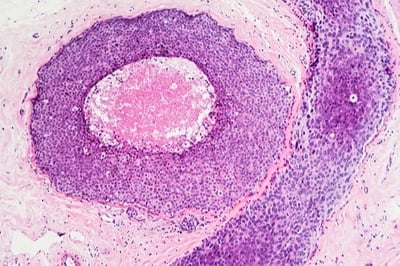FORCE's eXamining the Relevance of Articles for You (XRAY) program looks behind the headlines of cancer news to help you understand what the research means for you.
XRAY is a reliable source of hereditary cancer research-related news and information.
Learn more about the XRAY program
In portal: Breast Cancer, Categories Risk for Recurrence
Relevance: Medium


Quality of Writing: High


Article : A cancer patient’s tumor is genetically profiled—how does that info help treatment?
Relevance: Medium


Quality of Writing: High


Most relevant for: People diagnosed with advanced cancer
Jessica Wapner's Scientific American article explores the difficulties of making the vast amount of information acquired from tumor gene tests useful to patients and physicians. (9/20/16). Update: THIS INFORMATION HAS BEEN UPDATED. In late 2017, the FDA approved two separate tumor profiling tests to help guide treatment choices. The FoundationOne CDx (F1CDx) genomic test has been approved to test for 15 different targeted therapies used to treat five types of cancer, including ovarian, colorectal, lung, breast and melanoma. The FDA also approved the MSK-IMPACT and developed for use by Memorial Sloan Kettering Cancer Center (MSKCC) to scan tumor samples for 468 different cancer-associated mutations or alterations.
Read More
Relevance: Medium-High


Strength of Science: High


Research Timeline: Post Approval


Study : Extending aromatase inhibitor duration to 10 years lowers recurrence for ER/PR+ breast cancer patients
Relevance: Medium-High


Strength of Science: High


Research Timeline: Post Approval


Most relevant for:
Hormonal therapy reduces the risk of recurrence for women with early-stage breast cancer that is ER-and/or PR-positive. Standard therapy lasts 5 years. A new study looks at whether extending one type of hormonal therapy, known as aromatase inhibitor therapy, to 10 years lowers recurrence rates even more for these women. (7/26/16)
Read More
Study : Can long periods of fasting protect against breast cancer recurrence?
Most relevant for: Breast cancer survivors
Previous research in mice suggested that long periods of fasting provide protection against factors that are associated with a poor cancer outcome. A new study associates prolonged fasting (13 hours or more) at night with a lower risk of breast cancer recurrence, but no association between fasting time at night and mortality. While these findings are interesting, more research needs to be done to confirm them. In the meantime, breast cancer survivors should discuss any concerns about nutrition with their health care providers. 05/30/16
Read More
Relevance: Medium


Strength of Science: Medium


Study : More patients with invasive breast cancer opting for double mastectomies
Relevance: Medium


Strength of Science: Medium


Most relevant for: Women diagnosed with breast cancer who are recommended to undergo a single mastectomy
There are a number of surgical options for treating invasive breast cancer. These include lumpectomy with radiation, a single mastectomy to remove only the breast with cancer, or a double mastectomy, which removes both breasts. A new study finds that more women are choosing double mastectomy, even though it does not increase overall survival for these patients. (5/3/2016)
Read More
Relevance: Medium


Strength of Science: Medium


Research Timeline: Human Research


Study : Cellular diversity in tumors may predict survival for some types of breast cancer
Relevance: Medium


Strength of Science: Medium


Research Timeline: Human Research


Most relevant for: People diagnosed with breast cancer that is "high-grade" or aggressive
Some tumors are made up of many different types of cells, while others contain generally the same cell type. This study found that among people with high-grade breast cancer, those who have tumors made up of many different cell types have a lower 10-year survival rate than people with tumors containing only a single type of cells. This research is an early step towards developing a new test that can help physicians identify cancers that need more aggressive treatment, but more research is needed before it is ready for clinical use. (4/26/16)
Read More
Relevance: Medium-High


Strength of Science: Medium-High


Research Timeline: Post Approval


Study : Smoking before or after a breast cancer diagnosis associated with poorer breast cancer survival
Relevance: Medium-High


Strength of Science: Medium-High


Research Timeline: Post Approval


Most relevant for: People who smoke cigarettes
Cigarette smoking is an important public health issue that causes more than 480,000 deaths annually. Smoking increases the risk of many diseases, from heart disease to stroke. This research indicates that smoking before and or after a diagnosis of breast cancer affects survival, and also shows that it is never too late to quit smoking. (02/23/16)
Read More
Relevance: Medium


Strength of Science: Medium


Research Timeline: Animal Studies


Study : Sugar promotes tumor growth and metastasis in mouse model breast cancer
Relevance: Medium


Strength of Science: Medium


Research Timeline: Animal Studies


Most relevant for: People diagnosed with breast cancer
Previous human studies found associations between high sugar intake and breast cancer risk. This study looked at the direct effect of sugar on breast cancer growth and metastasis in mice. While researchers observed that sugar increased tumor growth and metastasis, more work needs to be done to see if this finding is relevant in humans. It is important to remember, the overall health benefits of limiting sugar intake remain undisputed. (02/02/16)
Read More
Relevance: Medium-High


Strength of Science: Medium-High


Research Timeline: Post Approval


Study : Does lumpectomy or mastectomy provide better survival for women with early stage breast cancer?
Relevance: Medium-High


Strength of Science: Medium-High


Research Timeline: Post Approval


Most relevant for: Women with early stage breast cancer
Previous research has hinted that women who have breast-conserving surgeries have the same, if not better, overall survival as women who have mastectomies. Researchers in this study wanted to see if that was true; they found that women who chose breast-conserving surgeries did have a higher overall survival. However, this study, presented at the 2015 San Antonio Breast Cancer Symposium, had limitations that make it difficult to interpret the results or to extend them to all women with breast cancer. (01/19/2016)
Read More
Relevance: Low


Strength of Science: Medium


Research Timeline: Animal Studies


Study : Do antioxidants encourage the spread of cancer cells?
Relevance: Low


Strength of Science: Medium


Research Timeline: Animal Studies


Most relevant for: The clinical relevance of this study for people is not clear
Scientists do not yet know why some cancers spread to other parts of the body (a process called metastasis). A study in mice suggested that high doses of some antioxidants (chemicals that can protect cells from damage) might actually make it easier for cancer cells to spread. (12/01/2015)
Read More
Relevance: Medium


Strength of Science: Medium


Research Timeline: Human Research


Study : New research may lead to a blood test that detects breast cancer recurrence earlier
Relevance: Medium


Strength of Science: Medium


Research Timeline: Human Research


Most relevant for: People diagnosed with early stage breast cancer
Recent headlines announced a blood test that can potentially predict which breast cancer survivors are at risk of recurrence. This particular blood test, one of many being developed, is sometimes called a “liquid biopsy.” This early research focuses on a technique that is promising, but not yet available to breast cancer survivors. (10/12/15)
Note: THIS INFORMATION HAS BEEN UPDATED on 11/07/19 with newly-published data. See our updated article: A new blood test may help predict early-stage breast cancer patients at highest risk for recurrence.
Read More
